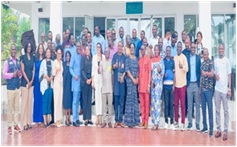By Ibrahim Sorie Koroma
Senior Health Promotion Officer, Health Education Programme –Ministry of Health
Freetown, Sierra Leone — October 29, 2025: The Ministry of Health has launched a three-day workshop to kick start the development of a National Health Information Hub (NHIH) — a major step toward transforming Sierra Leone’s health data systems from fragmented, paper-based reporting into a unified, real-time digital platform that supports evidence-based decision-making.
Opening the event, Deputy Minister I, Prof. Charles Senessie, emphasized the urgent need to replace the existing paper-based system with digital, real-time data solutions that can enhance health planning and service delivery. He described the initiative as “a milestone in strengthening the country’s health intelligence capacity.”
Senior Permanent Secretary, Mr. Andrew L. Sorie, highlighted digital transformation as essential for efficiency, accountability, and scalability within the health sector. Meanwhile, Chief Nursing and Midwifery Officer, Dr. Patricia Bah, underscored the critical role of nurses and midwives in data generation and analysis, stressing their inclusion in all digital health initiatives.
In his remarks, Deputy Chief Medical Officer for Clinical Sciences, Dr. Mustapha S. Kabba, called for national data ownership and the establishment of an independent health intelligence system. Echoing this call, Director of Policy, Planning, and Information, Dr. Tom Sesay, reaffirmed the Ministry’s commitment to data-driven decision-making as a cornerstone of health sector reform.
Day One featured a series of technical presentations assessing the current state of health information systems and setting out the workshop’s key objectives.
Madam Regina Samuels, Digital Health Coordinator, presented on the progress and challenges within the digital health ecosystem, while Monitoring and Evaluation Specialist, Mr. Nelson Fofanah, highlighted the ongoing burden of manual reporting and persistent data quality issues at the facility level.
To address these challenges, Digital Health Advisor, Dr. Inibong Ekong, introduced the National Digital Health Enterprise Architecture — the technical framework designed to enable interoperability across all health information systems. However, ICT Manager, Mr. Capri-Lonko Koroma, shared findings from a recent eReadiness Assessment, revealing that only 50% of health facilities currently have access to reliable electricity, posing a significant infrastructure challenge.













